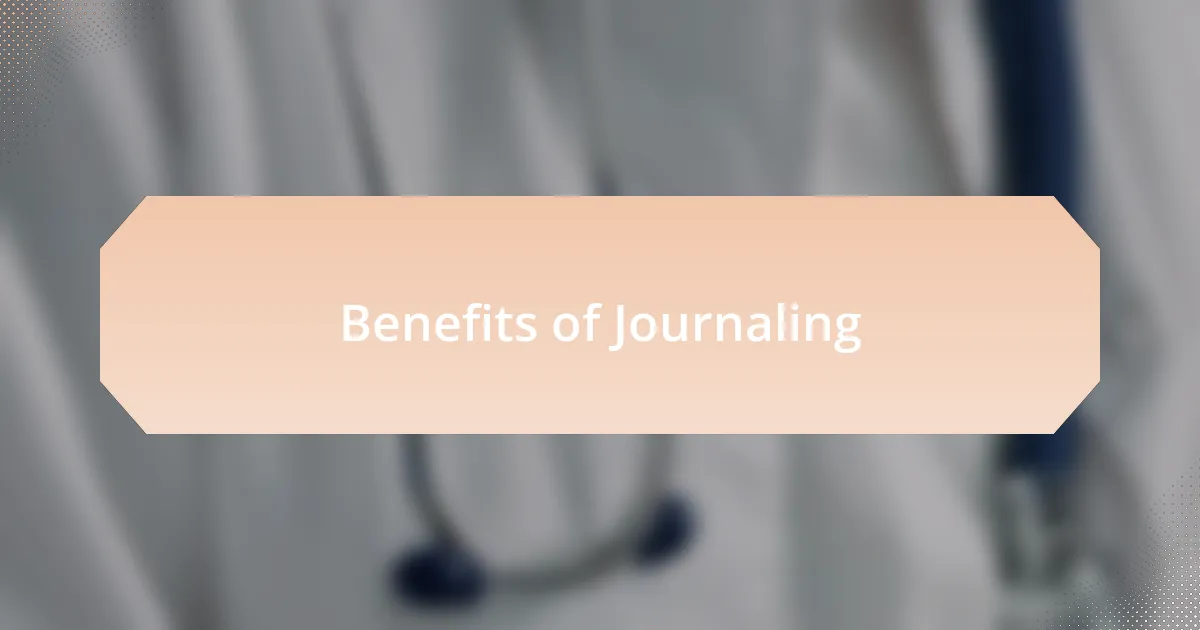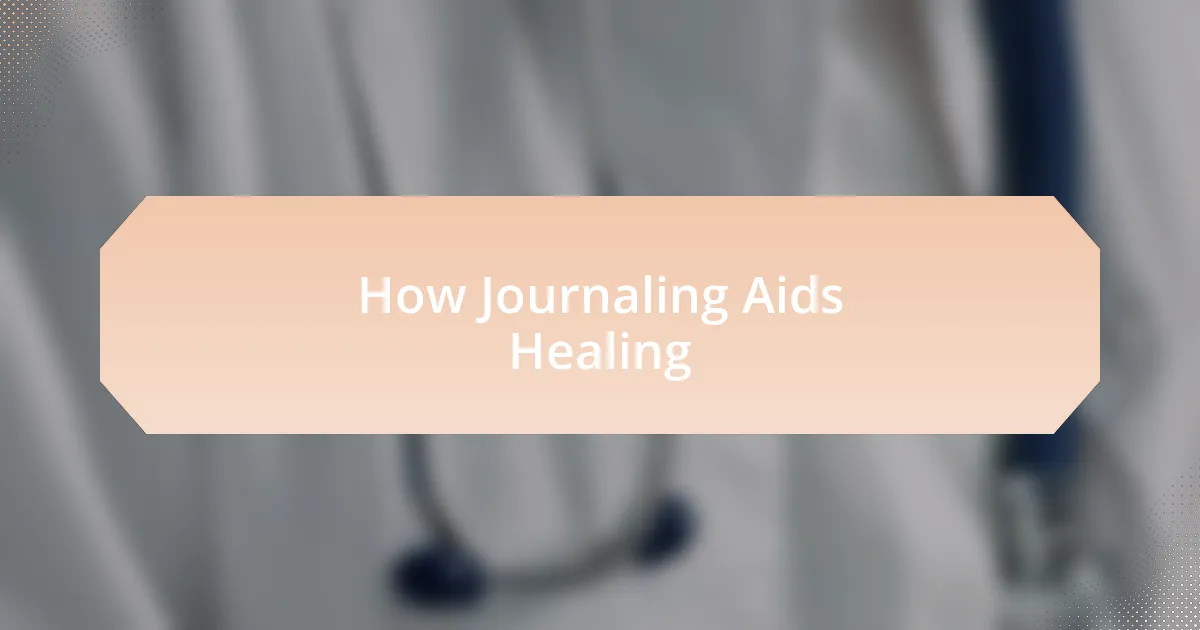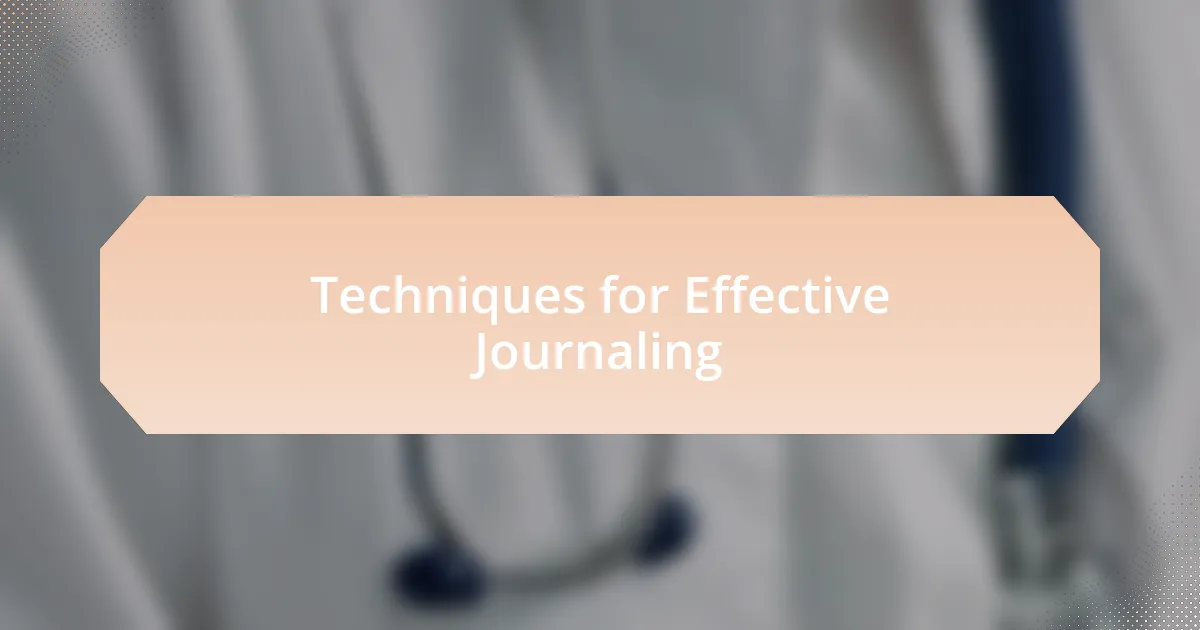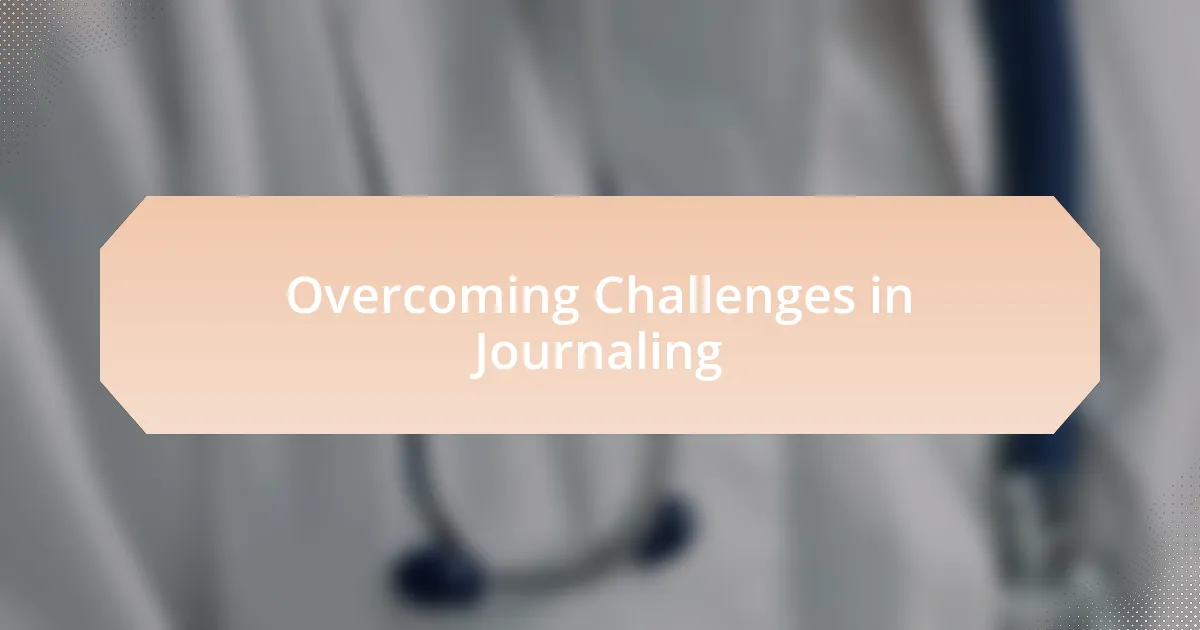Key takeaways:
- Hospital ministry combines physical and spiritual support, highlighting the power of empathy and listening to foster healing.
- Journaling serves as a tool for emotional expression and personal growth, helping individuals confront pain and recognize patterns in their experiences.
- Effective journaling techniques include establishing a routine, using prompts for inspiration, and embracing a free-writing style for raw expression.
- Sharing journal experiences can build connections and foster community, providing support and reinforcing the healing process.

Understanding Hospital Ministry
Hospital ministry is a profound expression of compassion and care, often springing from a deep desire to support those facing medical challenges. When I first encountered hospital ministry, I was struck by how the presence of a caring individual could shift the atmosphere in a sterile hospital room. Isn’t it incredible how a simple conversation can foster hope?
The essence of this ministry lies in bridging the physical and spiritual needs of patients and their families. I remember visiting a friend who was undergoing treatment; amidst the fear and uncertainty, a chaplain’s words brought a sense of peace that I had not anticipated. How often do we underestimate the power of empathy and listening in that critical environment?
Through hospital ministry, we find ourselves not just giving comfort but receiving it as well. In my interactions with patients, I learned just how healing it can be to share stories and express fears. Isn’t it fascinating how, in the act of serving others, we often experience our own healing?

Benefits of Journaling
Journaling can be a remarkably effective tool for healing, allowing individuals to express their thoughts and emotions without judgment. I remember a particularly difficult time when I started writing about my experiences in hospital ministry. It was not just a way to process what I witnessed but also a means of understanding my own feelings amidst the grief and hope I encountered daily. How liberating it felt to put pen to paper—did you know that expressing emotions through writing can actually alleviate stress?
Beyond just emotional release, journaling serves as a mirror reflecting personal growth over time. As I looked back through old entries, I noticed patterns in my thoughts and behaviors that I hadn’t been aware of. It was like reading someone else’s story, where I could see my progress and the healing journey I was undertaking. Isn’t it empowering to see measurable growth in ourselves, especially when life can feel overwhelmingly stagnant?
Moreover, journaling creates a safe space for exploring spirituality, providing clarity during challenging times. There were moments when I combined reflections with prayers, and I found a deeper connection to my faith. Writing down my hopes, fears, and sacred thoughts became a dialogue with my spirit, enriching my ministry work. How transformative can it be to connect with a higher purpose through documentation?

How Journaling Aids Healing
Journaling aids healing by giving us a tangible way to confront our pain and joy. I recall an evening spent in quiet reflection, where I allowed my pen to flow freely as I documented my fears about another hospital visit. It felt like lifting a weight off my chest, as each sentence captured the turmoil inside me. Have you ever noticed how our fears often lose their grip when we bring them into the light?
The practice also serves as a historical account of our emotional journey. There were times when I faced setbacks that felt insurmountable; looking back at those moments in my journal allowed me to reconnect with the resilience I possessed. Each page told a story of trials and triumphs, reminding me that healing isn’t linear. Isn’t it reassuring to know that our struggles can be documented milestones along the way?
Moreover, journaling can unlock profound insights about ourselves that might stay hidden in everyday life. I’ve often surprised myself with the revelations that emerged during writing sessions—thoughts I couldn’t articulate out loud suddenly poured out onto the page. When was the last time you let your heart speak freely? By giving space to our inner dialogue, journaling helps us understand our emotions more deeply, fostering real healing.

Personal Insights from My Journey
There were moments when I felt utterly overwhelmed by my experiences, and journaling became a lifeline for me. On particularly tough days, I would sit in a corner of my room, pouring my heart out onto the pages. I realized that articulating my feelings made them tangible, transforming my distress into words I could confront. Isn’t it incredible how transforming chaos into text can foster clarity?
As my journey progressed, I discovered that journaling was not just a release; it was a bridge to self-discovery. I distinctly remember one evening when I stumbled upon a recurring theme in my entries—an unspoken yearning for connection. Writing about my experiences highlighted how crucial relationships were in my healing process, prompting me to reach out to friends and family. Have you ever noticed how our words can lead us to profound realizations about our needs?
In reflecting on my growth, I find that journaling gifted me a unique perspective on positivity. After a particularly challenging hospitalization, I began listing small wins in my journal—things like the first sip of coffee in the morning or a kind word from a nurse. This simple practice revealed the importance of gratitude and shifted my focus from pain to appreciation. How often do we overlook the small victories in our lives?

Techniques for Effective Journaling
Choosing a consistent time to journal can significantly impact the effectiveness of your writing. For me, mornings are the best. There’s something magical about the quiet before the world wakes up, which allows my thoughts to flow freely. Have you ever noticed how that stillness can help you access deeper feelings? Setting aside that time, I found, transformed journaling into a sacred ritual rather than just another task on my to-do list.
Another technique that worked for me is utilizing prompts to spark my creativity. Some days, I would feel stuck, staring blankly at the page. I discovered that prompts like “What am I grateful for today?” would help me dive into my emotions and explore different facets of my experience. These little nudges can lead to heartfelt reflections, surprising insights, and even unexpected laughter. What have you found to be a useful prompt in your own journaling?
As I embraced a free-writing style, I allowed my thoughts to spill onto the page without judgment. This approach meant that I didn’t have to worry about grammar or organization; I just wrote whatever came to mind. I found this liberating, especially when I felt weighed down by my circumstances. It felt like a mental detox! Have you ever experienced that rush of relief when letting go of perfection? That’s the beauty of free writing—it encourages raw honesty and can provide a powerful release.

Overcoming Challenges in Journaling
Despite the benefits of journaling, I often wrestled with the challenge of vulnerability. Sharing my deepest feelings on paper can feel daunting, like peeling away layers that I’ve carefully crafted over time. Have you ever hesitated to pour out your thoughts because it feels too raw? I learned that embracing that discomfort can be a pathway to healing; it’s in those moments of honesty where I discovered profound truth and growth.
Another common hurdle in journaling is the fear of judgment—either from myself or others. I vividly remember writing about my struggles and worrying about who might read my words, even if the journal was meant solely for my eyes. The turning point for me was realizing that my journal was a safe space, free from criticism. Once I reframed it as my personal sanctuary, I found it easier to express my authentic self. Have you found it challenging to silence that inner critic?
Some days, the words simply wouldn’t flow. I experienced moments of complete mental block, where staring at a blank page felt more suffocating than liberating. In those instances, I turned to nature, taking a quick walk to clear my mind. The fresh air often revived my thoughts, leading me back to my journal with a renewed perspective. When has stepping away helped you regain clarity in your writing?

Sharing Your Journal Experience
Sharing my journal experience has been one of the most enriching aspects of my healing journey. I remember the first time I opened up about my writings with a friend. It felt like stepping off a cliff into the unknown—thrilling yet terrifying. But as I shared snippets of my thoughts and emotions, I was met with understanding and support, which reinforced my belief in the power of connection through vulnerability. Have you ever experienced that sense of relief after being truly heard?
In another instance, I decided to share my journaling practice in a small group setting. At first, I was hesitant—how would others perceive my raw reflections? But to my surprise, my candid moments prompted rich discussions among us. It was like opening a door, allowing my struggle to resonate with others. The shared stories created a bond of empathy that lifted us all. Have you thought about how sharing your journey could also inspire someone else?
Sometimes, I reflect on how sharing my journal entries feels like gifting a piece of my heart. Each shared word can spark dialogue, provoke thought, or even help someone feel less alone in their own struggles. I’ve realized that while the act of journaling is deeply personal, the experience of sharing it can cultivate a community of healing and support. Isn’t it powerful to think about the impact our words can have on others?